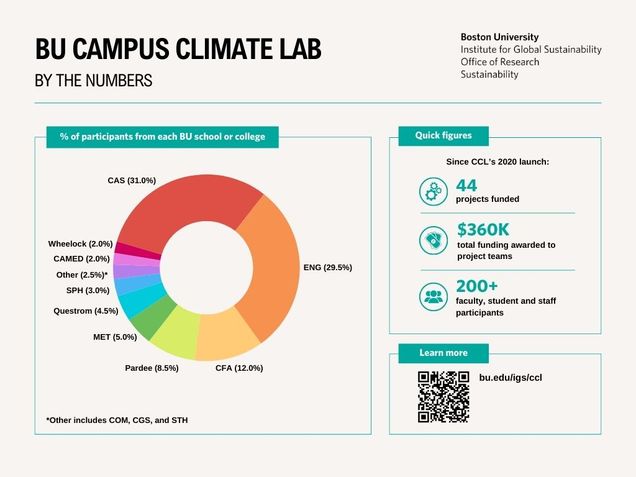Announcing Newly Funded BU Campus Climate Lab Projects for Fall 2024
This fall, Boston University (BU) Institute for Global Sustainability, in partnership with BU Sustainability and BU Office of Research, awarded funding for two new Campus Climate Lab projects to reduce electricity usage on campus and explore Nature-based Solutions to build climate change resilience. Funding was also provided to three continuing projects on classroom air quality, building energy storage, and microplastic emission reduction.
Through Campus Climate Lab, student-mentor teams use BU’s campuses as a living laboratory for exploring climate action, advancing equity and justice through sustainability research, and developing innovative solutions to support the goals of BU’s Climate Action Plan.
Since launching in 2020, Campus Climate Lab has provided a total of $360,000 to 44 teams. This season’s awardees include faculty, students, and staff from the College of Engineering (Electrical, Mechanical, and Computer Engineering), the College of Arts & Sciences (Earth & Environment and Physics), and the Pardee School of Global Studies (International Relations).
Explore current and past Campus Climate Lab projects and apply for funding.
Campus Climate Lab by the Numbers | Fall 2024

Campus Climate Lab Project Goals | Fall 2024
Buildings and Operations
- Deploy 20 newly designed, low-cost air quality sensors to monitor classroom environments in real time and gather feedback to support recommendations for improved air quality and energy efficiency
- Analyze thermal and electric storage solutions for all-electric buildings, such as the Center for Computing and Data Sciences (CDS), and their effects on energy demand and costs
Climate and Health
- Address BU vulnerability to climate change and support sustainable urban development by identifying Nature-based Solutions to enhance resilience and provide benefits such as heat reduction and improved social cohesion (NEW)
Reducing Waste
- Investigate microplastic emissions from BU laundry facilities to develop high-throughput filtering solutions tailored to BU’s needs and create an actionable plan to eliminate microplastics from laundry wastewater
- Install electrical meters and engage with communities in select residences to reduce electricity usage during peak demand periods and provide insights for scaling these practices across BU facilities (NEW)